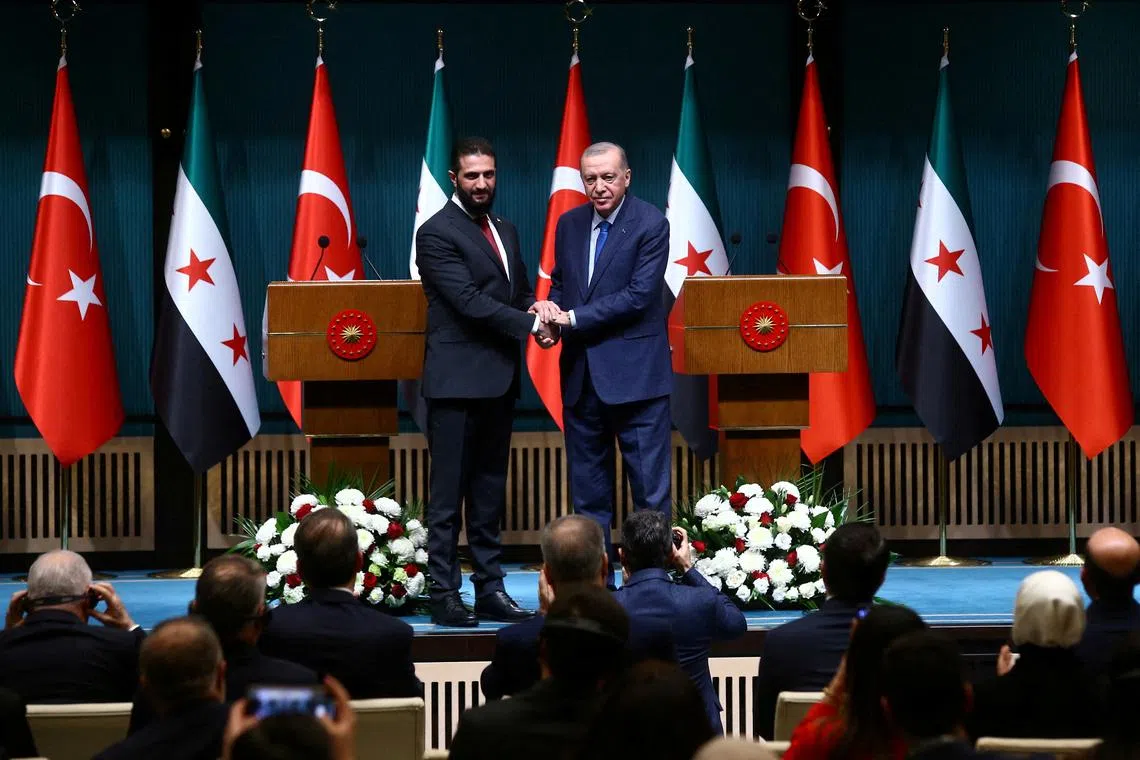Turkey backs Sharaa’s stability efforts, Erdogan says amid Syrian violence
Sign up now: Get ST's newsletters delivered to your inbox

Turkish President Tayyip Erdogan (right) with interim Syrian President Ahmed Sharaa. Turkey said it is determined to support stabilisation efforts in Syria.
PHOTO: REUTERS
ISTANBUL – Turkish President Tayyip Erdogan said on March 10 that Turkey was advising the Syrian authorities to help ease tensions and welcomed interim Syrian President Ahmed Sharaa’s commitment to punishing those who acted outside the law.
“Sharaa is pursuing an inclusive policy without falling into the trap of revanchism. Continuing this approach will thwart the games being played against Syria,” Mr Erdogan said after a Cabinet meeting in Ankara.
Mr Erdogan’s political opponents have urged him to use his influence over Syrian leaders to curb the violence that erupted in the neighbouring country
The main opposition Republican People’s Party (CHP) called for an international peacekeeping force to maintain security in western Syria, just south of Turkey, if the government could not ensure civilian safety there.
Clashes between loyalists of deposed Syrian president Bashar al-Assad and the country’s new Islamist rulers have killed more than 1,000 people, mostly civilians, in Dr Assad’s coastal heartland in recent days, according to a war monitoring group.
Turkey, the strongest foreign backer of Mr Sharaa, has condemned the violence and reiterated its support for the interim Syrian President.
The instability could damage Ankara’s hopes of ending a decades-old conflict with Kurdish militants, some based in Syria, and possibly slow a flow of Syrians returning home from Turkey in recent months after 13 years of war in Syria.
“Turkey must take initiatives with the Damascus administration and make the necessary efforts to prevent such incidents from happening,” Mr Ali Mahir Basarir, a senior CHP lawmaker, said during a visit to the border province of Hatay.
“The escalation of clashes represents a major risk for Turkey,” he added.
Visiting Jordan at the weekend, Turkish Foreign Minister Hakan Fidan said Turkey was determined to assist the Syrian government in every way and support stabilisation efforts.
Mr Sharaa has vowed to catch those responsible for the killings, and Syria’s defence ministry announced on March 10 the completion of military operations against the remnants of Dr Assad’s forces.
Relative calm followed Dr Assad’s ousting in December 2024.
Groups representing Turkey’s minority Alevi community demonstrated in Istanbul and Ankara at the weekend to protest against the violence in Syria and voice support for Alawites, a distinct group that shares Alevis’ Shi’ite Muslim roots.
The top commander of a Syrian Kurdish armed group, whose forces are in a separate battle with Turkey, has blamed Turkish-backed Islamist factions for some of the most disturbing violence: the reported executions of Alawite civilians.
Turkey did not respond to the allegation.
Turkey has backed anti-Assad Syrian forces for years and maintains bases in Syria’s north. Its defence ministry said there was no surge in deployments late last week, after sources in Syria said more armoured vehicles had crossed the border.
“We see that certain sectarian and ethnic provocations are being used by certain groups through proxy forces,” Mr Omer Celik, the spokesman for Mr Erdogan’s ruling AK Party, said on March 10. REUTERS


